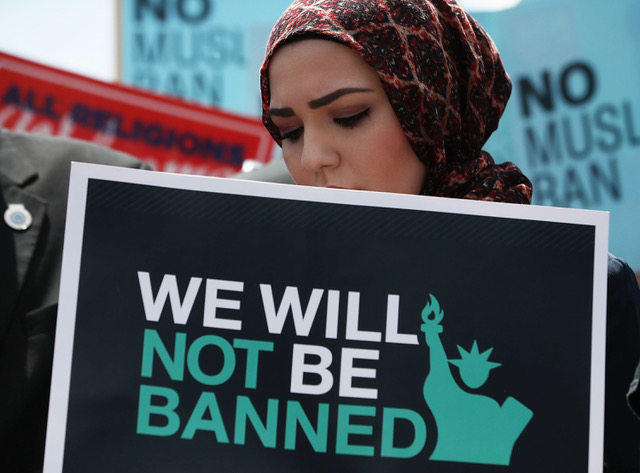The former President of the United States, Donald Trump, has pledged this week to bring back his controversial ban on travel to and from Muslim majority nations, if he is successfully re-elected in the next Presidential election in 2024. At a New Hampshire rally this week (Thursday) he stoked his audience of supporters by saying:
‘I will restore my travel ban to keep radical Islamic terrorists out of our country…you saw what happened. Four years…You saw that right? We were very tough on that. We don’t want our buildings blown up.’
A diversion tactic?
The former President’s public appearance in New Hampshire, was the first of such appearances since facing a plethora of legal indictments, in front of a Grand Jury in New York at the end of March 2023. The world’s media has been focused on Donald Trumps high profile trial at the centre of which is the saga of hush money allegedly paid to adult (porn) film actress ‘Stormy Daniels’. The trial represents the first time a President or former President has ever been indicted and some have suggested Trumps invoking of the Muslim Ban issue is an attempt to divert the attention of the media from other issues.
Islamophobia witnesses higher surge than post 9/11
But for Muslims across the United States, the threat is all too real. In the weeks after Trumps election in 2016, Mosques across the US were subject to a major surge in hate mail and hateful phone calls, some of which threatened Muslim genocide. The National Communications Director for The Council on American Islamic Relations, Ibrahim Hooper said at the time:
‘The election seems to have empowered and emboldened the undercurrent of bigotry in our society…People who might not normally air their bigoted views now believe that it’s acceptable…and that’s a very troubling phenomenon.’
A catalogue of anti-Muslim hate crimes
There were a number of notable anti-Muslim episodes which marked the Trump presidency during the first 18 months and which made international headlines. These included the shocking story of the killing of two men on a train in Portland Oregon in May 2017, who had attempted to intervene when a man hailed anti-Muslim insults at two women. The attention of the world’s media was also drawn to an incident in January of the same year in Quebec City, Canada, during which six people were killed and ten injured when a gunman indiscriminately opened fire with an automatic weapon. The rise in Muslim hate crimes witnessed a staggering increase by as much as 20% during this period. This represents a much higher rise than that experienced in the aftermath of 9/11. The failure of Muslims to visit relatives or to be able to attend funerals during the Covid 19 Pandemic caused enormous distress across the US.
However the problem of Islamophobia did not disappear with the election of Joe Biden to the Whitehouse. More recently, in August 2022, the killing of Four Muslim men in a drive by shooting incident in Albuquerque grabbed the headlines and stirred fresh fear among Muslim communities.
Just this week 29th April 2023, in response to Trump’s recent outburst threatening a reintroduction of the Muslim ban, Nihad Awad, Executive Director of the Council of American Islamic Relations, said:
‘You can’t teach an old dog a new trick. Trump is desperate to scapegoat Muslims and other minorities again in order to distract his extremist base’s attention away from his criminal past. We will defend the rights of Muslims and other Americans against any and all illegal and undemocratic actions.’
Muslim ban reversal, but no future protection
There was a hugely positive response from the Muslim community in the US to President Joe Biden’s decision back in December 2020, just after his election, when he announced that he intended to reverse Trumps Executive order imposing the ban. However, despite a vigorous campaign by lobby and advocacy groups in the US, there has been a failure to put on the statute books such legislation as the much called for ‘No Ban Act’, which would ensure that no future administration can ‘abuse its executive powers to enact a discriminatory ban’. There have also been calls for the amendment of the ‘Immigration and Nationality Act’, which currently fails to provide protections for discrimination based on religious affiliation, which have failed to get any traction in congress.
Muslims across the US will now have to wait and see, what the 2024 elections have in store for them.












